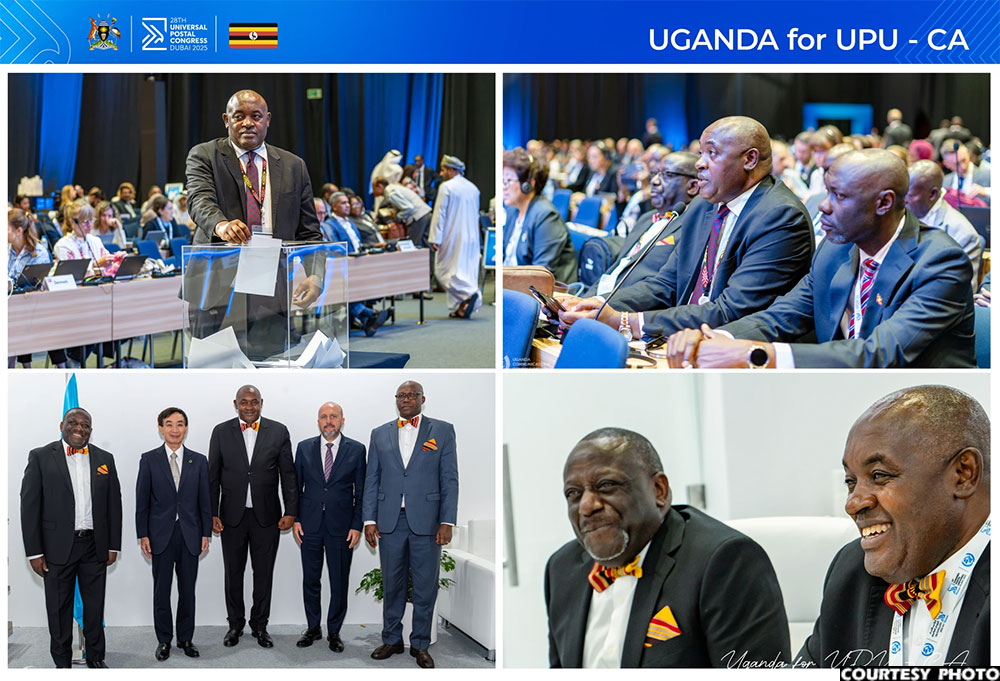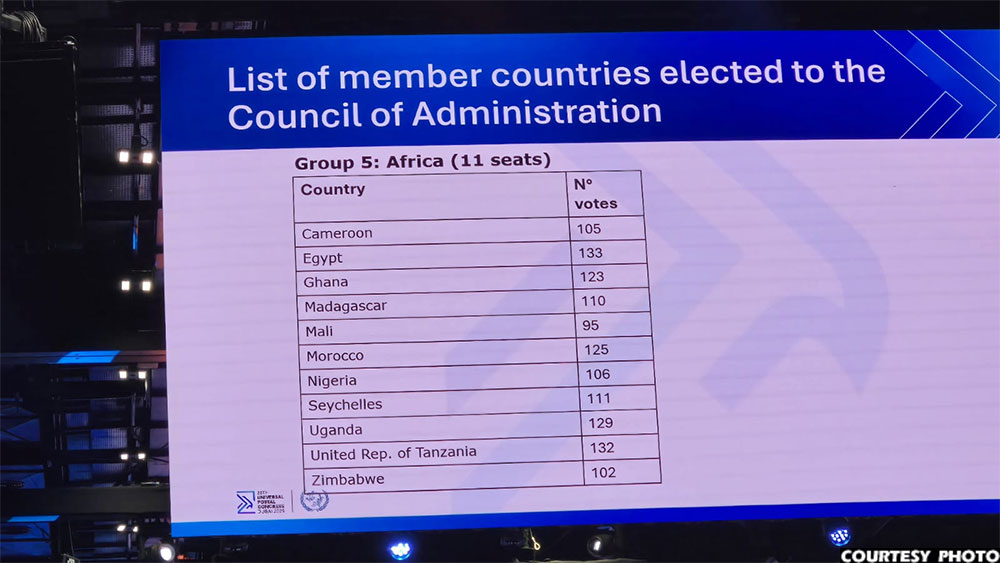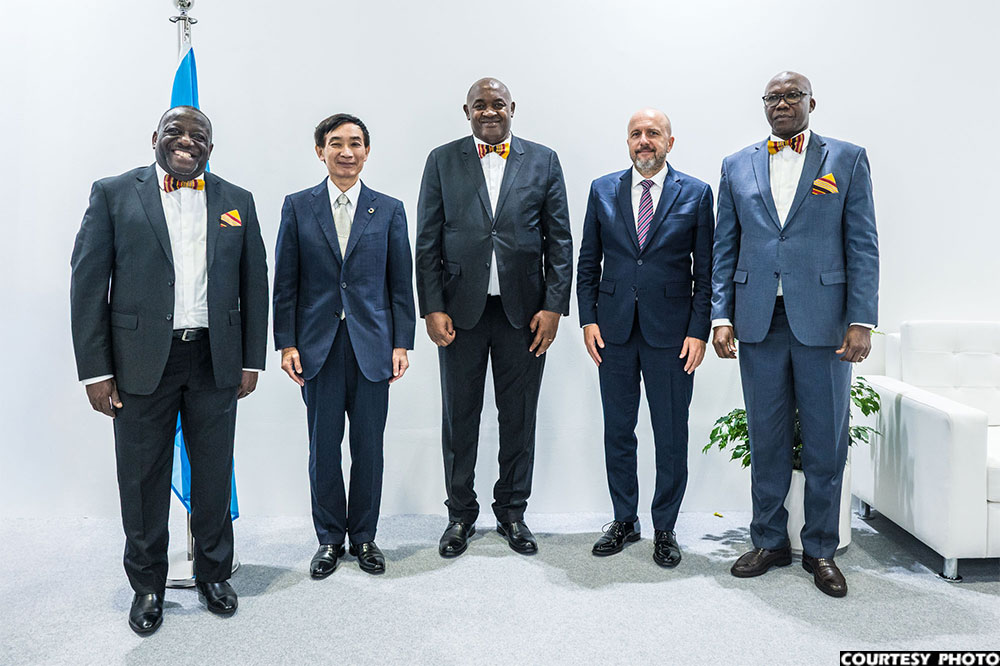Postal services: Uganda elected to UPU's Council of Administration
Uganda says its presence on UPU's Council of Administration will strengthen its visibility in international organisations as well as boost its reputation in the global community.
Uganda took one of the 11 seats for Africa on the Council of Administration of the Universal Postal Union, during the 28th UPU Congress in Dubai, UAE. (Courtesy photo)
__________________
COMMUNICATIONS
Uganda has been elected to the Council of Administration (CA) of the Universal Postal Union (UPU) for the next four-year cycle of 2026-2029, during which the UN agency will be guided by a new vision and direction.
The election happened at the 28th Universal Postal Union Congress in Dubai, United Arab Emirates (UAE), a 12-day event that concluded on Friday (September 19).
The CA is one of the four bodies of the UPU, the 192-member United Nations' specialized agency for postal services. The other bodies of UPU are the Congress, the Postal Operations Council (POC) and the International Bureau.
Uganda is now one of the 41 members of the Council, whose role is to ensure the continuity of UPU's work between Congresses, supervises its activities and studies regulatory, administrative, legislative and legal issues.
Meeting annually at the UPU headquarters in the Swiss capital Bern, the CA has the power to approve proposals by the POC for the adoption of regulations or new procedures until the next Congress.
The Council can also take measures it considers necessary to resolve urgent issues.
It approves the UPU's biennial budget and accounts, as well as yearly updates on the UPU's strategy and budget. It is also responsible for promoting and coordinating all aspects of technical assistance among member countries.
Eleven seats on the Council were available for Africa. Uganda (129 votes) was successfully elected alongside Cameroon, Egypt, Ghana, Madagascar, Mali, Morocco, Nigeria Seychelles, Tanzania and Zimbabwe.
ICT and National Guidance minister Dr Chris Baryomunsi led Uganda's delegation in Dubai and delivered Uganda's statement during the congress.
Uganda said its election to the Council reflects the confidence of the international community in its "commitment, reliability, and leadership".
The East African nation, fondly referred to as the Pearl of Africa, believes its presence on the Council will strengthen its visibility in international organisations as well as boost its reputation in the global community.
The Uganda Communications Commission (UCC), which regulates postal services in Uganda, celebrated the achievement, saying — on social media platform X — it "marks Uganda's strongest international ICT election win in recent history".
UCC executive director Nyombi Thembo was also part of the Ugandan delegation in Dubai.
In Uganda, postal and courier services — distinct but related systems — are turned to for sending and delivering mail, packages, and other items.
According to UCC, postal services are often government-owned, and responsible for the provision of the universal postal service (delivery of mail to all citizens regardless of their geographical location, at affordable rates).
Courier services, on the other hand, are usually provided by private companies and focus is on speed and reliability with options for express or same-day delivery.
In the photo below, meanwhile, UPU director general Masahiko Metoki (second from left) welcomed the Ugandan lead team at the congress.

What else happened in Dubai?
As expected, it was an engaging 12 days of meetings at a Dubai congress that drew representatives with 169 member countries physically present, as well as observers. Generally, delegates discussed the future development of the postal sector.
Host nation UAE, represented by Tariq Al Wahedi, was appointed as the chair of the CA for the next four-year cycle.
France, represented by Jean-Paul Forceville, was re-elected as the chair of the Postal Operations Council of the UPU for the same period.
The member countries re-elected Japanese Masahiko Metoki as director general of UPU and Slovenian Marjan Osvald as deputy director general, for their second term.
As expected, it was an engaging 12 days of meetings at a Dubai congress that drew representatives with 169 member countries physically present, as well as observers.
UPU’s first-ever artificial intelligent (AI) agent analyzing data on postal network development was tested and showcased at the congress. It was developed with seed funding provided by Japan.
According to UPU, the pilot AI agent operates on its Unified Data Platform combining all relevant UPU big data and other data sources to analyze postal development.
"This enables informed advice on policy, regulatory and operational changes to improve postal reach, relevance, reliability and resilience at the country-level. It can also be used to test-drive potential solutions," said the agency.
The member countries approved changes to UPU’s multilateral framework for postal financial services, extending the organization’s support to a wider set of optional postal financial services.
UPU will be guided by a new vision and direction for 2026-2029, as decided by member countries, who adopted the UPU’s Strategy (2026-2029) and its associated roadmap, the Dubai Business Plan.
Member states also voted to allow the State of Palestine additional rights to participate in UPU decision-making processes as an observer.